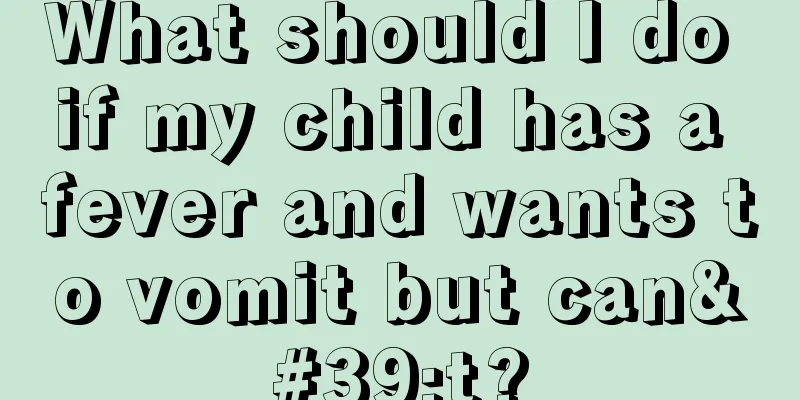What to do if your newborn is breathing heavily

|
Many careful parents may have observed that their children have heavy breathing a few days after birth. In fact, this is what we often call shortness of breath. So what is the reason for this shortness of breath and heavy breathing in children? How can we treat this symptom of the baby? Let's take a look at it below: Under normal circumstances, the baby's breathing will be normal. Only under abnormal circumstances will the baby's breathing become rapid. Therefore, at this time, parents need to send the child to the hospital for examination to see the baby's specific physical condition so that timely treatment can be given. What to do if your baby is breathing rapidly: 1. Difficulty breathing. The early manifestations of respiratory distress in newborns are increased respiratory rate, shallow and rapid breathing, and then nasal flaring. When the condition is more serious, the triple concave sign can be seen (i.e. the supraclavicular fossa, suprasternal fossa and intercostal space are concave at the same time). At the same time, the child's face and mouth turn blue. In severe cases, groaning, grunting or respiratory arrest may occur, all of which indicate that the condition has further deteriorated. The condition of a newborn changes rapidly and should be detected and treated early. If the condition worsens, the newborn should be sent to the hospital for emergency treatment in time. 2. Respiratory arrest. Normal newborns may sometimes have irregular breathing, with the interval between two breaths sometimes being 5-10 seconds, but without changes in heart rate or complexion. This is called periodic breathing. Apnea refers to the cessation of breathing for 10-15 seconds or even longer, accompanied by a slowing of the heart rate to less than 100 beats per minute, and the appearance of cyanosis and decreased muscle tone. Apnea can be divided into primary and secondary. What to do: If you find the above situation, you should inhale high-concentration oxygen and perform artificial respiration in time. Try to avoid actions that may induce respiratory arrest. Insert the gastric tube gently. Pay attention to the amount of milk, speed and posture when feeding to avoid respiratory arrest caused by gastric reflux. For frequent respiratory arrest, oxygen can be given through a mask and mechanical ventilation can be used. At the same time, the primary disease should be treated and hypoglycemia, hypocalcemia, etc. should be corrected. 3. Suffocation. After the fetus is delivered, if there is no breathing for 1 minute or only irregular, intermittent, shallow breathing, it can be determined as neonatal asphyxia. What to do: Keep the airway open and perform artificial respiration, oxygen supply, etc. To prevent neonatal asphyxia, pregnant women must undergo regular prenatal examinations to detect abnormalities in a timely manner and provide appropriate treatment. Abnormal fetal sounds indicate fetal hypoxia. The mother should be given oxygen in time and an appropriate delivery method should be chosen. The mother's emotions must be stable during labor, because apnea after hyperventilation can reduce the fetal oxygen pressure to a dangerous level. In addition, when parturients use anesthetics, analgesics, and sedatives, they must strictly follow the indications and dosages. When a newborn baby has heavy and rapid breathing, it is also an adverse reaction, so if you find that your baby has similar symptoms, don't panic. According to what we mentioned above, when the child finds these symptoms, you must take emergency measures in time, but when performing first aid, you must provide symptomatic treatment in time according to the child's illness symptoms. |
<<: How to arrange the diet for a one-year-three-month-old baby
>>: What to do if a newborn has an upper respiratory tract infection
Recommend
What should I do if my baby has blisters on his tongue?
I believe many parents have had this experience: ...
What are the complementary foods for babies in August?
When taking care of your baby, you must do it com...
Treatment of white tongue coating in babies
We all know that many babies have white tongue co...
What is the best medicine for disinfecting a baby's belly button?
Everyone knows that babies have different physica...
What to do if children have bacterial infection and fever
When children feel unwell, they need to go to the...
Treatment of upper respiratory tract infection in newborns
In fact, the body resistance of newborns is relat...
Steps of Pediatric Massage
We know that we value children. In addition to gi...
How to correct a child's hunchback
When children are in the growth and development p...
How much milk does a two month old baby eat?
Nowadays, people born in the 1980s and even the 1...
What should I do if my newborn baby is restless when sleeping and always blushes and pushes the quilt with his hands?
Many young people are first-time parents and have...
Reasons for baby nausea and retching
In daily life, every parent hopes that their chil...
What should I do if my baby’s tooth enamel is not fully developed?
It is common to see some children whose teeth tur...
White bumps on baby's gums
Babies are a treasure in the hearts of their pare...
Can babies eat prunes? Let’s take a look at these suggestions
Prunes are produced in the southwest of France. T...
The dangers of enlarged tonsils in children
For children, the immune function is not yet full...









